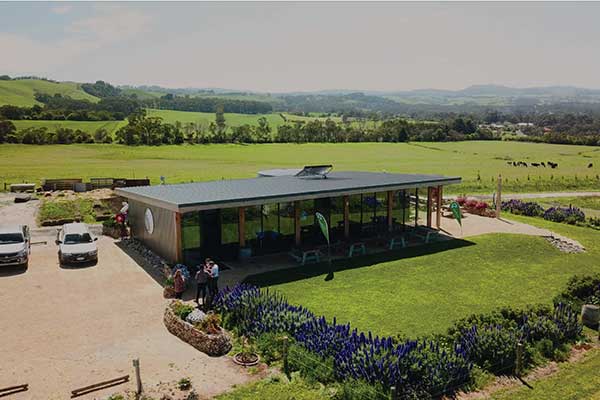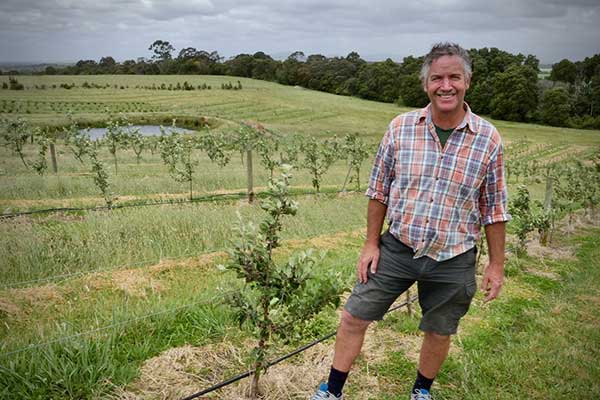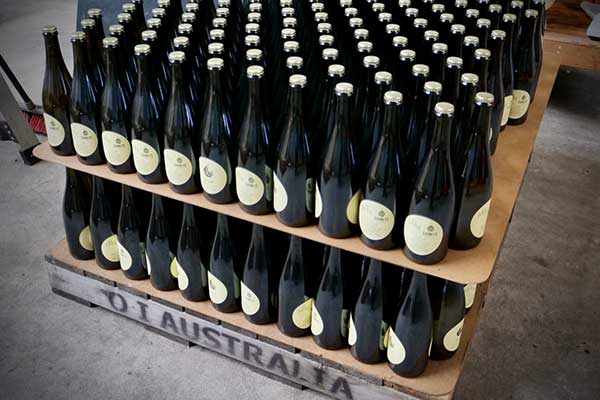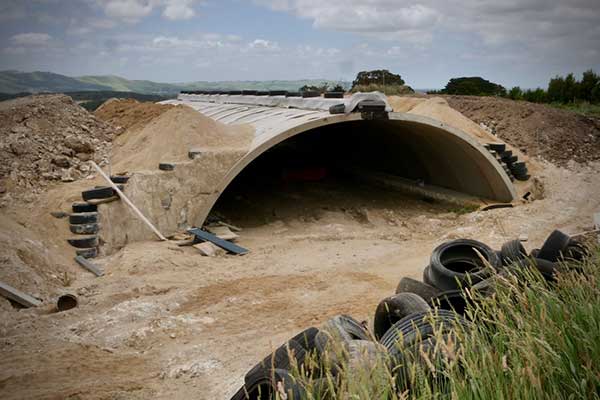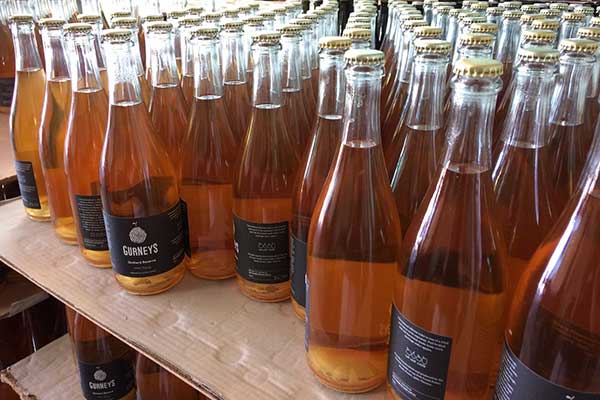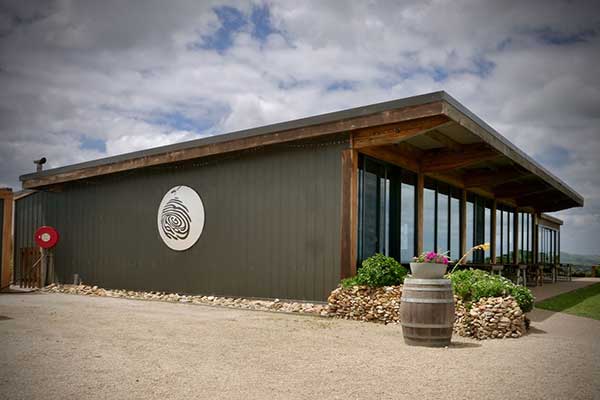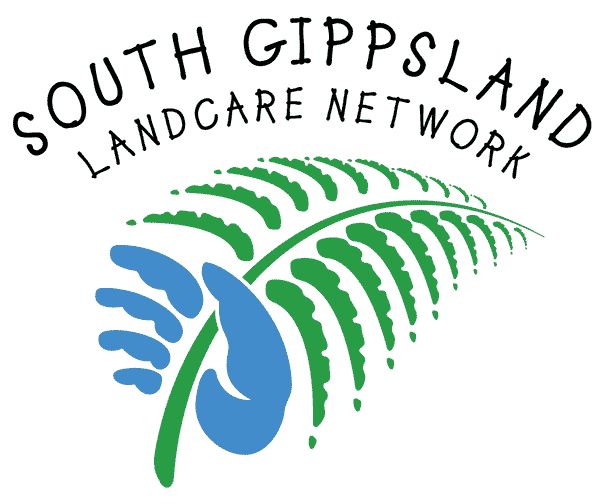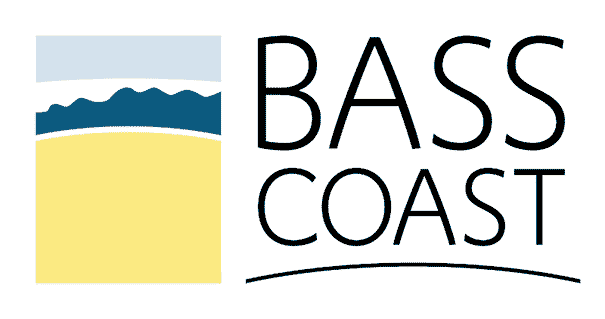Gurneys Cider: Integrating the past into an innovative future
Farmers: Bill, Lorraine, Tom and James Gurnett
Enterprise: Horticulture and Brewing – Apple and pear cider production
Catchment Management Region: West Gippsland
Landcare Network: South Gippsland
LGA: South Gippsland Shire Council
Landform: Strzelecki Ranges
Soil Type: Organic loam on a heavy clay
Annual Rainfall average: 848.5 mm or 33.4 inches (Source Bureau of Meteorology)
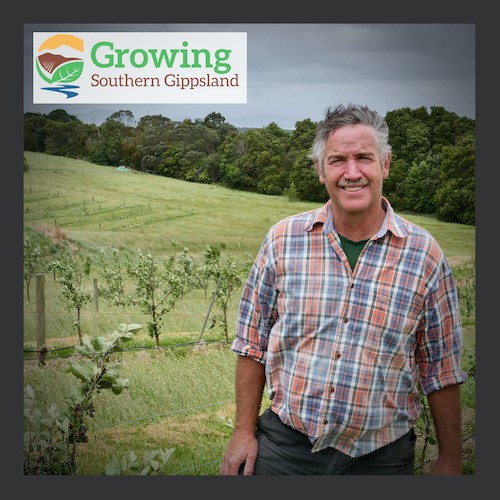
Gurneys Cider is an enterprise owned and operated by the Gurnett family – Bill, Lorraine, Tom, and James. It comprises an orchard and cider making operation, with a cellar door. Established in 2013, the orchard includes heritage apple and pear varieties as well as wild apple varieties discovered by the Gurnetts in the local area, chosen because they have adapted to the local growing conditions over time. This wild stock is used to grow and graft apple trees for the Cidery which is located on 70 acres of former dairy farming land. Cider made from traditional methods and other local produce is sold from the cellar door located on the farm, overlooking the picturesque Wilsons Promontory National Park.
The Plan
The Gurnetts emigrated from Somerset to Australia in 2003. They decided to develop a cider business in Southern Gippsland, motivated by memories of 'scrumping' for apples on the ground in the UK, as well as drinking Somerset cider and failing to find equivalents in Australia.
"We had a set of criteria we were looking for to fulfil our business requirements to set up an orchard and a cidery. We bought the block and began to restore the block, do all the soil testing, and formulate a more detailed plan of where we were going to go with the orchard. We've expanded the footprint of the orchard; the footprint of the grazing has reduced."
The enterprise is in the process of development and is much more than land and buildings. It is about sourcing the apples and pears, growing the apples and pears and developing the procedures to process and produce cider, a distinctive cider. It is also about integrating the enterprise into the community, via materials for buildings, the sale of local produce and sourcing from local business.
Integrating the past into an innovative future
From the outset, the family have focused on the tree stock for the orchard.
"…the advice there was to diversify your crop…to see which varieties will grow well…We've got about 25 varieties on two different root stocks…we wanted to find the right root stocks…now we're on 1000 trees a year from the best of the varieties that we have found work".
As the orchard was being established, Tom Gurnett went to the UK to study cider making. They also sought out information on apples and cider production from other knowledgeable local people. Notably, they went to a local apple provider to source stock suited to the Gurnetts needs:
When we put the first trees in, we deliberately went to find the local experts. Mark Brammar up on Strzelecki Heritage Apples…has got a great collection of heritage apple trees and we found the heritage cider apple trees in his collection and we started with 30 of the ones that we felt were the best adapted.
The commitment to planting apple trees well-suited to local conditions has also led to sourcing from wild trees in the area, drawing on the practice of 'scrumping' for apples. They source their apples from their orchard and the region, they 'scrump' and they self-source.
"scrumpy is the product of scrumping. Scrumping is the collection of apples not on your land. So in the UK as kids we used to go scrumping - we' would go into the neighbour's farm and go to his orchard and acquire his apples, so that's scrumping."
So, now they are incorporating the 'wild apples' in the orchard, these days taken from roadsides, old rail trails and public land around Gippsland, rather than neighbour's farms.
"One of the varieties of cider we make is…made from the wild apples that we find in the area, that are local to Foster. We go out and find the trees that have grown from discarded apple cores and pips, the ones that are genetically unique. The best of those in terms of cider making, the ones that have got high tannins, we're now taking cuttings of those wild trees and bringing them in to the orchards".
The Gurnetts regard these varieties of apple trees as unique, and as they have thrived without the support of traditional orcharding practices, are well suited to the region and are likely to be low maintenance.
"We're finding new varieties of apples, wild apples, that are genetically unique, and we're bringing those into the orchard. Because we feel when we find a great tree that's 50 years old, full of apples, it's never been pruned, it's never had any pesticide applied, we're going to start to bring those in and rear those in the orchard as cropping trees. Because they are the best adapted and…we couldn't get any better adapted to the local environment and the local conditions. Really that's what we need in the future, is trees that are going to grow without…irrigation, worrying about pests and disease."
Due to the success of the locally sourced tree stock, in 2018 the Gurnetts took the decision to switch the planting of their annual 1000 trees from heritage cider apple trees to wild trees.
The Gurnetts see their approach as designing a low-maintenance system suited not just to the current conditions in Southern Gippsland, but also one that is capable of surviving in a changing climate.
"We've designed a system that's…low intensity, the spacing is far greater, we're not pushing the trees so hard. We're not pushing the ground so hard because we're aware of the potential for things to change and we want to have that built in resilience in our plan to be able to accommodate change more easily without having to rely on petrochemical products."
Using Old and New Practices
The research by the Gurnetts into cider making meant they have been able to produce cider using traditional methods that are more environmentally sympathetic to the product. They use the older traditional techniques of pressing the fruit, using the traditional cloth and rack method, no additions, with fermentation using indigenous yeasts.
The Gurnetts combine the old and the new. They have built an underground cellar, in part using remnants from the Hazelwood electricity generator decommissioned in 2017 and demolished in 2019. As James noted:
"The Hazelwood chimneys have fallen, but the arches have risen! It's a privilege to have a small piece of Australian history in our South Gippsland backyard...The arches will soon be covered by earth and eventually be used to store Gurneys Cider at a consistent temperature year-round" (16°C).
At the time of writing, the project was approximately three quarters complete.
In effect they are addressing questions relating to sustainability and recycling as central to their practice. As James evocatively stated:
"We have inadvertently offset the CO2 creation in the underground cellar, we can do it all naturally." (Herald Sun 2020).
In 2020, the Gurnetts installed a fully automated counter pressure bottling line, supported with a development grant from Agriculture Victoria. Rather than import from outside Australia, they partnered with a local business manufacturer (Omicron Automation) and had the line built in the neighbouring town of Leongatha, underwriting their commitment to supporting local Southern Gippsland enterprises.
The planning and development of the orchard has always been concerned with sustaining the operation with a changing climate.
"We deliberately designed an orchard that's not intensive. It's quite a traditional orchard because we are aware that things are changing climatically. We don't want to be reliant on having to irrigate."
The future-planning continues, embedding more modern technologies alongside the heritage apples and traditional production methods:
"And in the future, we'll be digitising…once our orchards are more established, we'll be looking at monitoring each crop, each variety of crop year-on-year so we can look in 10 years' time, what do we need to be planting."
The Insight: Blending the New and the Old
The Gurnetts have been both methodical and experimental in the conversion of their land from beef farming to apple orchard and cidery. They have drawn on traditional techniques, expert knowledge and new ways of looking at how to implement sustainable systems of production, most notably through 'scrumping' for apple stock but also by focusing on the local in relation to building materials and sourcing machinery.
Video
Website resources
www.gurneyscider.com.au/
www.facebook.com/gurneyscider/videos/220307932569180
www.facebook.com/hashtag/naturalcidermaking
Images
